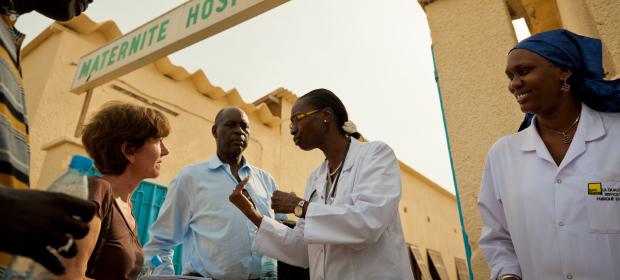Where We Work
See our interactive map


As someone who has worked in this field for over 25 years, it is with mixed emotions that I prepare for the International Family Planning Conference in Dakar later this month. I can’t help but think about the progress that was made in the 1980s around family planning such as the vibrant work done by local affiliates of the International Planned Parenthood Federation, international nongovernmental organizations, and other champions. They were pioneers in so many ways and in many countries in introducing information and services in communities and in developing reproductive health policy guidelines. But then in the 1990s, we saw the rapid loss of so many of those gains and a plateau in funding from donor agencies and governments to support this work. HIV/AIDS soon became the priority focus and with it other infectious diseases as well, especially malaria and tuberculosis.
Today, I look at the numbers, particularly in West Africa where we still see contraceptive prevalence in the single digits in several countries, and I see lost opportunities. At the forefront of my mind are the many countries in West Africa that lag behind other regions of the world—countries such as Benin, Chad, Mali, Mauritania, Niger, and Senegal. Last month, the world reached a population of seven billion, making efforts around poverty alleviation, sustainable development, and climate change all the more imperative.
The largest donors in this area of reproductive health and family planning have been undoubtedly the United States, the United Kingdom—both English-speaking countries—and the United Nations Population Fund (UNFPA). I think West Africa, particularly the French-speaking West African countries, have lagged behind for several reasons. One is language, but the region is also difficult to work in with swaths covered by the Sahel desert. Migration and poverty plague the region, and bolder, deeper leadership commitment is imperative.
The first International Conference on Family Planning, held in Kampala, Uganda, in 2009, re-energized global family planning champions and created a real momentum for those of us who so deeply care about this issue. To avoid loss of that momentum and prevent future recurrent lapses, we need to work toward more sustainable family planning programs that are country-led and less dependent on outside resources. I believe we can do so by improving the ways we engage countries themselves, by promoting more policy change, and by encouraging leaders to be more courageous.
I urge leaders and policy-makers to get inspiration from those countries that have been bold in talking about family planning, and doing so in the context of development, poverty alleviation, and economic growth. While continuing to emphasize the many health benefits of family planning, we should not shy away from addressing the demographic aspects as well as the human needs and rights, especially of those 215 million women in the world who want to use family planning but don’t have access to services.
I salute new commitments such as those made by the French government to invest in reproductive health in West Africa, as well as renewed and strong engagements of USAID, the Bill & Melinda Gates Foundation, and the Hewlett and Packard foundations. Recently, we published an article on new work IntraHealth is launching in collaboration with civil society organizations in West Africa to encourage the acceptance and use of family planning. I believe this is part of the solution—identifying new champions, and promoting new perspectives and strategies. This is what I am hoping for from Dakar: the re-energizing of a stronger movement for family planning, one that is galvanized and includes these new champions. We know, of course, that there are endless opportunities with health workers to reach each person they care for, and their families, but we can go beyond that to engage people from all sections of civil society, especially young people.
I invite the old and new players to think and act creatively to mobilize and leverage social media, and to harness technology in ways that allow us to develop more effective, more innovative family planning programs.
Get the latest updates from the blog and eNews




